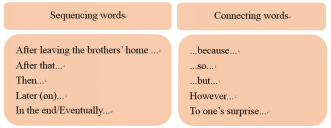 Unit 5 The Value of Money
Unit 5 The Value of Money
Listening and Speaking & Listening and Talking
Teaching Aims
1. Students can get the detailed information from the listening and the video.
2. Students learn the listening strategy—make inferences in order to understand the inner information.
3. Students learn the value of money from the two stories and have a good attitudes towards the money.
4. Students can retell a story by using the sequencing words and connecting words.
Important Points and Difficult Points
1. Students can get the detailed information from the listening and the video.
2. Students learn the listening strategy—make inferences in order to understand the inner information.
3. Students can retell a story by using the sequencing words and connecting words.
Teaching Procedures
Part A Listening and Speaking— Discuss the good deed of returning lost money
Step 1 Before listening—Small talk
1. We know money is very important. What can you use it to do?
2. What do people have to buy in order to lead a good life?
3. What can people buy without money?
Step 2 While listening—Task 1
Listen to the news report and match the people with the correct information.
 1. Chen Liyan A. the owner of the lost money
1. Chen Liyan A. the owner of the lost money
2. Wang Zheng B. a cleaner at Taiyuan railway station
3. Ma Dongbao C. a police officer living in Chen’s apartment building
4. Liu Xia D. Chen’s 16-year-old daughter
Step 3 While listening—Task 2
Listen again and put these events in the correct order. Then check the answers in class.
Step 4 While listening—Task 3
Listen again and decide if the following statements are true (T) or false (F) in Activity 4. Then have several Ss check the answers in class.
Step 5 Post listening—Speaking
1. Go through “Make inferences” in Activity 5. Then discuss your answers to the questions with
your partner and explain your reasoning.
(1)What kind of person do you think Chen Liyan is?
(2)Did Chen return the money because she didn’t need it?
(3)Is it common for people to do what Chen did?
(4)How did Wang Zheng feel about the return of his money?
(5)Why did Ma Dongbao tell Wang about Chen’s family?
(6) How did the news reporter feel about Chen’s actions?
2. Work in groups of four. Discuss the following questions. Then ask some Ss to share their ideas.
(1)Do you agree with Chen Liyan? What would you do if you were in her situation?
(2)When we help someone, should we expect to get something in return?
(3)What do you think is the best way to get money?
(4)Should we judge people based on how much money they have?
Step 6 Pronunciation—Intonation
语调(intonation),即说话的腔调,就是一句话里的声调(pitch)高低抑扬轻重的配置和变化。世界上没有一种语言是单一的声调说出的,以英语为例,英语有五种基本语调:升调(↗)、降调(↙)、升降调(∧)、降升调(∨)以及平调(→)。升调和降调是英语中最基本,也是最重要的两种语调。
降调的基本意义是表示肯定、完整、结束等意义,主要用于陈述。
升调的基本意义是表示不肯定、不完整、未结束等意义,主要用于提问。
例如:
(1)A:Jean, can you bring me the newspaper?
B:↗Sorry?
Jean用升调说Sorry,其意思是I didn’t hear you. Could you say that again,please?
(2)A:Jean, can you bring me the newspaper?
B:↙Sorry.
Jean用降调说Sorry,显然其意思是拒绝帮助或无能为力。
(3)A:Mr. Smith thinks we ought to get the money in hand first.
B:↗Who?
A:Mr. Smith.
B用升调说Who,表示听不清对方谈话中的某一部分,要求对方再重复那一部分。
(4)A:We’d like to have someone to say a word at the beginning to welcome the group.
B:↙Who?
A:We thought that you or Dr. Johnson might do it.
B用降调说Who,其意思是问,对方想让谁在开场时致欢迎词。
Step 7 Pronunciation—Practice
1. Listen to the short conversation and mark the intonation with ↗, ↙ or ↙, ↗. Then discuss with a partner what they intend to convey by using different intonation.
Owner: You know what?↗ It’s a million-pound bank note↙.
Waiter 1: Really?↗(question)
Waiter 2: Really!↙(unbelievable and surprised)
Waiter 3: Really?!↙↗(first question then surprised)
2. Listen to the conversations. Underline the parts that are stressed and mark the intonation. Then talk about the implied meanings of the responses with different intonations. Listen again and repeat.
(1)Henry: It’s a nice suit.
Owner: Oh, it’s perfect!↙(The intonation means it is very suitable for Henry.)
(2)Henry: Well, that’s very kind of you.
Owner: Kind, sir?↗(what you said is not right) No, it’s kind of you. You must come whenever you want and have whatever you like. Just having you sit here is a great honour!!↙(welcome you to come again)
(3)Henry: Well, to be honest, I have none.
Oliver:(happily) What luck!(excited) Brother↗, what luck!↙(It means “Didn’t you hear it?”)
Henry: Well, it may seem lucky to you but not to me!↗(angry) If this is your idea of some kind of joke, I don’t think it’s very funny. Now if you’ll excuse me, I ought to be on my way.↙(If so, I would leave.)
Roderick: Please don’t go↙...(hope Henry can wait for a moment)
Part B Viewing and Talking—Describe people’s changing attitudes in a film clip
Step 1 Before-listening—Talk about the film
1. You are going to watch part of the film The Million Pound Bank Note. Look at these photos and guess what happens in the film.

2. Have Ss try to tell us the story about the film and start with “The film tells…”
Step 2 While viewing—Watch the film
Watch the film and answer the following questions.
1. Why does the owner of the restaurant want Henry to sit somewhere else?
2. What does Henry order? Why is the waiter surprised?
3. Why does the owner think Henry hesitates to pay the bill?
4. Why does the owner think the bank note is probably real?
5. What happens in the end?
Step 3 Post viewing—Retelling a story
Work in groups. Retell the story in the film clip you have just watched. The pictures in Activity 1.
Retelling a story

Watch the film clip again and make up your own script to match it. Then watch the film without sound and act out your script for the class.
Step 4 Homework
Finish the exercises in Workbook.

